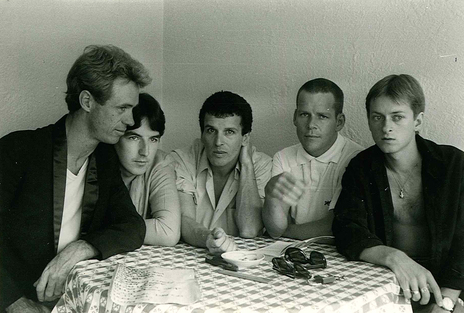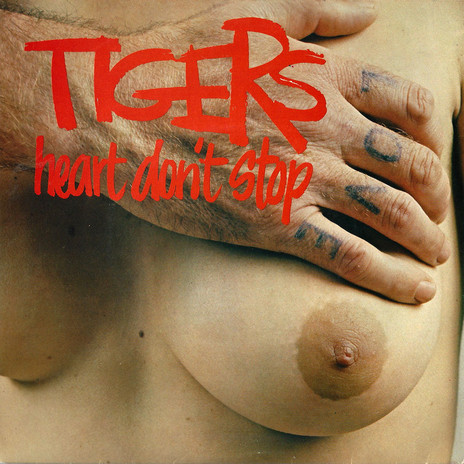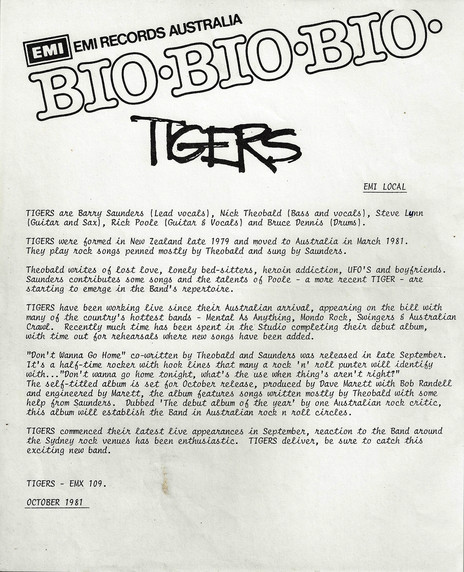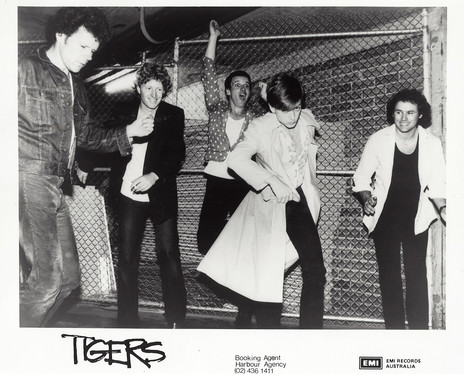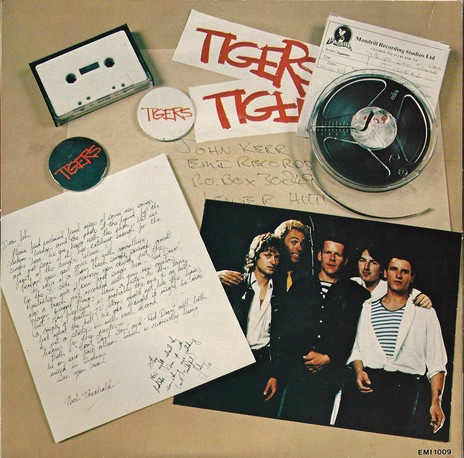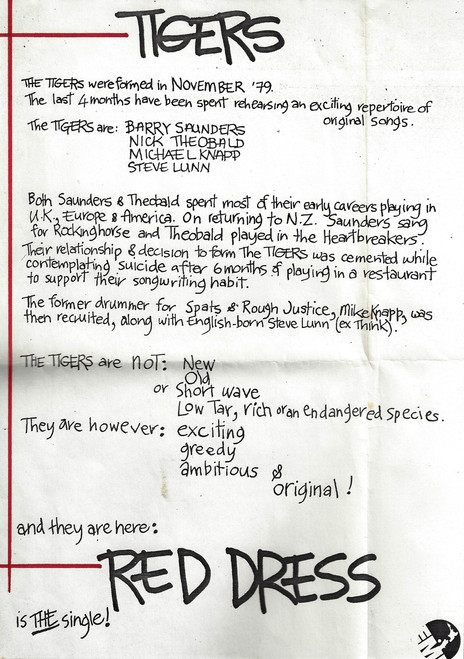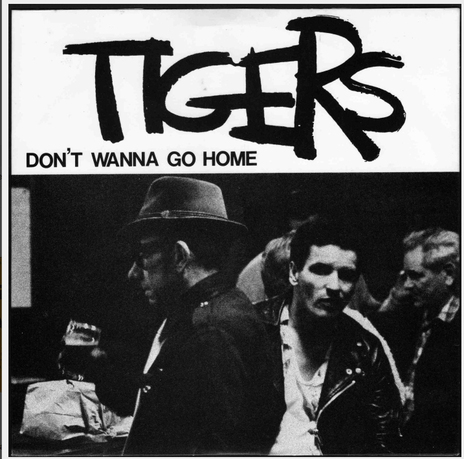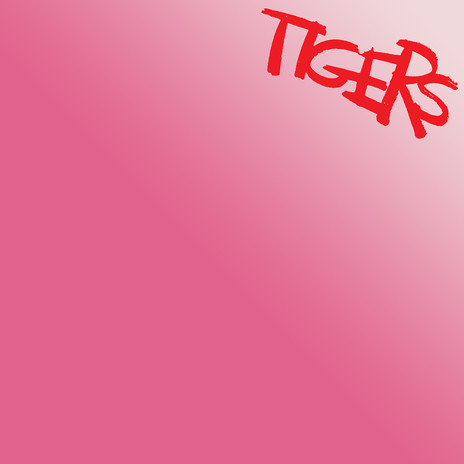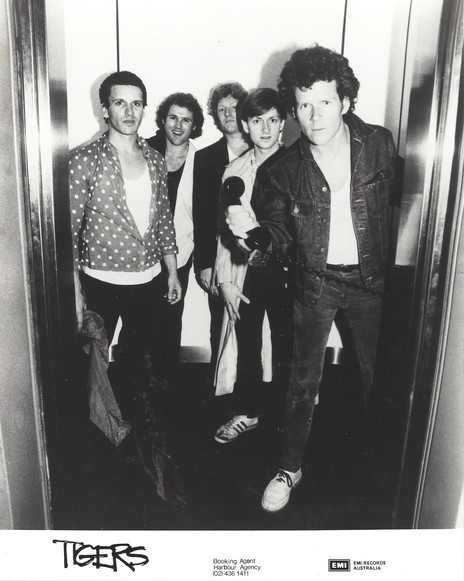In 1979, with Michael Knapp on drums, Barry Saunders on vocals and guitar and myself on bass, we twisted Simon Morris’ arm to get our show on the road. We rehearsed and chucked a repertoire together in Wellington. The band showed promise and we headed to Hamilton for our first appearance, to demonstrate to the paying public, that the contraption we’d assembled would fly.
The first gig was at the Hamilton Hotel. Surprisingly, all went well. We played a reasonable set and then went up to one of our bigger rooms with some pals. A few beers, some people drinking tea: peace, love and groovy times after the gig. Or so we thought. Suddenly, nine over-keen cops (from memory, two plainclothes, six uniformed male, and one female) burst into the room. As they did, the phone rang. As the cops muscled their way into our space, one of us picked up the phone. Ringing loud and clear through the earpiece came the voice of what we assumed, was one of the hotel staff, shouting, “The cops are on their way up!”
At this point, the head cop grabbed the phone and said, “We’re already here.”
He replaced the receiver, triumphant with this admittedly quick-witted remark and then asked, “So where’s all the dope?”
What? Some complete wanker (we never found out who, although we did some investigation), for some reason, had grassed on us. It was potentially heavy, but as all they found was my tiny marijuana stash, insecurely concealed in a muesli packet, the cops’ adrenaline rush was soon dispelled. I was pinched for enough grass, to roll a two-paper joint. The headline in the Monday paper read: “Musician makes second appearance.” Ha ha.
Returning to Wellington, Michael Knapp, Barry Saunders and I kidnapped soon-to-be permanent guitarist Steve Lunn from his sales job at Shand-Millers. Steve (lead guitar, sax) had grey flares on, but they didn’t last long.
We rehearsed a show comprising a mix of covers and originals and, with our trusty in-house support band The Wetas in tow, we toured.
Still based in Wellington, we rehearsed a show comprising a mix of covers and originals and, with our trusty in-house support band The Wetas in tow, we toured. For some reason, that none of us still cannot fathom, four guys in a 1965 Chrysler Valiant AP6 attracted unwarranted and unwanted attention of the Thin Blue Line, which I for one took as revenge for the Hamilton drug bust of the century … that clearly wasn’t.
We recorded a single, ‘Red Dress’, for EMI, produced by Steve Robinson. The tune was officially placed at No.28 on the New Zealand charts, but we’re sure it slid into the Top 20.
We scored the support for the New Zealand tour featuring Jon English and Baxter Funt in 1980. Due to Jon being a major draw, we played to huge houses, from Whangarei to Invercargill. It was so cool. The Jon English tour proved to be a valuable warm-up for the forthcoming main event – going to Australia.
Paul Walker took on the management role. We left Wellington and moved to Hamilton. Our drummer Michael, and his girlfriend and fantastic lighting operator Karen Norris, both came from the Waikato. Apart from the early run-in with the law, we liked Hamilton. It was like arriving in Las Vegas (you had to be there). Strategically, it also was a good base to tour the North Island from.
Wayne Mason joined, and the band suddenly had a bigger sound, due to his excellent keyboard playing.
We played, we toured, we recorded another single, ‘Heart Don’t Stop’, which was taken to Sydney for final track laying, and we signed a recording deal with EMI Australia.
After our spot at Sweetwaters in January 1981, we crossed the Tasman Sea.
If we thought Hamilton was Las Vegas, Sydney was Sodom and Gomorrah – in more ways than one.
Arriving in Sydney, we discovered that Australians have great senses of humour. Driving through Kings Cross on our first day, in a black Ford Fairmont, licence plate TOP10, with EMI A&R man Bob Randall (RIP) at the wheel, we saw the words of the prophets written on the Kings Cross wall: “NSW. The best police force money can buy.” What a great town!
We then followed a bus that had a billboard ad on its rear that said: “Computer Socks: they fall up not down.” This place was a riot. As we were soon to find out, even Australian band roadies would impress us newcomers with their irony.
A few days later, we arrived at one of our first big support gigs. Two roadies, (clearly with great mana, judging by the size of the bunched keys on their belts) from the headline act, approached us and, in a hearty spirit of trans Tasman mate-ship said: “You pricks help us load in and load out or … you hand over $50. OK? And you, (looking at me) get up that ladder and pass the guy up the other ladder this light.”
Such comedians.
If both roadies hadn’t looked like the Paul Bunyan statue in Fargo, we might have asked them to Foxtrot Oscar. At the Highland Games, these two would’ve been tossing Marshall quads, as well as cabers.
That night, we were supporting [solo artist and brother of Jimmy Barnes] Swanee and Rose Tattoo. Just as we were about to walk out on stage, one of the road managers, in further cross-Tasman good spirits, shouted out to us, “Get out there and fucking work it up them.”
We moved from charming Chatswood, at the insistence of the rambling home’s owner who discovered after a few weeks that we were not a family of Christian non-smokers with four adorable children.
Surrey Hills suited us smoking atheists far better. This was in the days when The Clock was a real Aussie pub, and not some yuppie hangout.
Like any NZ band eager to evolve from the Swamp of the Unknown, we played support gigs all over Sydney’s sprawl. In no particular order, we opened shows for: Mondo Rock, Australian Crawl, The Divinyls, The Radiators, Sunny Boys, The Sports and The Swingers, among others. We knew the guys in The Church – we once tossed a coin with them to see who’d go on first at Bondi’s infamous Astra.
After a few months in town, we recorded an album of original material at EMI’s 301 with Dave Marett and Bob Randell producing.
We shot a film clip for one of the tracks in Kings Cross. It was late at night and the Cross wasn’t disappointing anyone. One scene in the film clip was outside a strip club, where we heard the doorman’s immortal line: “Great lookin’ chicks inside – crack a fat or your money back.” The fun never stopped in Australia.
Eager to promote the album, EMI got us on the music show Countdown. We recorded the clip in Melbourne and then flew back to Sydney, as we were booked to play that night at Sydney’s legendary Gay Club, Signal.
As we were loading our gear in up the stairs, down came six cops with enormous plastic rubbish bins full of booze. They’d busted the owners for not having the appropriate paperwork. The owner said, as we walked in, “No worries mate, we’ve got more stashed in the Dungeon Room.” As we entered the club, a porn flick was playing.
Eager to share our music with the mustachioed mass, we fought back adrenaline rushes as we made our way through the thick vapour of amyl nitrate and hit the boards at about midnight. It’s fair to say, Les Boys hated us. We weren't asked back to Signal.
With the album in the can, Wayne Mason tendered his resignation and returned home. We replaced Wayne with guitarist Rick Poole from Auckland and pushed ahead. Some time after that we fired our friend and manager Paul, and then our friend and drummer Michael.
Anyone not in a band will never understand the dynamics that produce such slashing, burning and pillaging of the Innocent.
Anyone not in a band will never understand the dynamics that produce such slashing, burning and pillaging of the Innocent.
With new drummer Bruce Dennis and new manager Lyn Saunders, we pushed ahead. But, an undiscovered tribe of Mongolian pygmies could’ve guessed that the air was escaping from the balloon: chucking out good friends and trying desperately to replace the ballast was proving to be a struggle, against both sanity and gravity. We blimped on.
Our time on the road in Australia was nigh. Amazingly, we’d driven so far and to so many places, and we’d only had one brush with death: narrowly missing a car vs. car right in front of us while driving south along the Pacific Highway, soon after we first arrived.
As a last hurrah, we did a tour with Eric Burdon and his band, but with the burden of the road, the financial and human cost of living in Sydney, and the music no longer happening, the notice to quit came to pass in an unforgettably depressing Melbourne hotel room.
Halfway through 1983, we played our last gig at Sydney’s Manzil Room. As we’d done for several years, we closed our show with Mink DeVille’s ‘One Way Street’.
